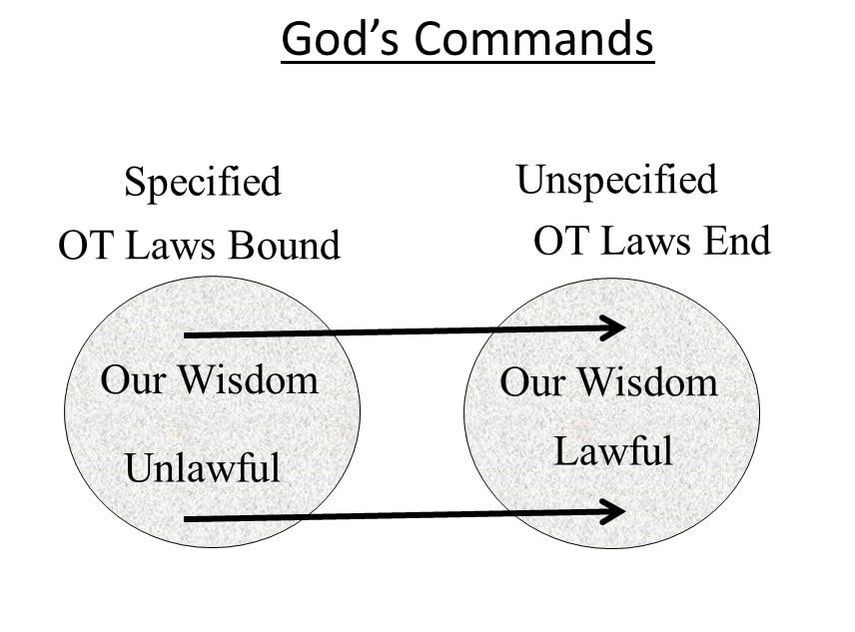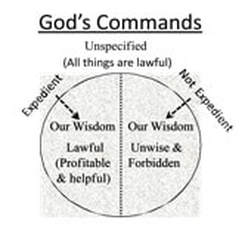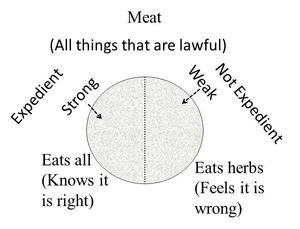How to Interpret the Bible (part 19) - Expediency: Principles for General Commands
Introduction. The zeal and conviction of those who trust in the Lord with all their heart is a critical part of the unity and stability of a local church. When God expresses His will, the faithful respond with all their heart, soul, mind and strength. Yet those with such zeal must be careful it doesn’t pass the limits of God’s authority. When we hold the same zeal toward our own opinions as we do toward Scripture, only harm and division can follow. This is a difficult line to identify and the danger of straying to the right or to the left should be ever present in our mind.
The complicated nature of this subject is evident when we consider that the entire chapter of Romans 14 and three additional chapters in First Corinthians (8-10) were written to explain them. As summarized in 1 Cor. 10:23, “All things are lawful; but not all things are expedient All things are lawful; but not all things edify.” "Expedient" here means "be better for, bring together, be expedient (for), be good, (be) profit(-able for)" (Strong's).
The instructions regarding expediency occurred after the Jews found it difficult to make the transition from the Law of Moses to the gospel and the Gentiles as they left idolatry with its superstitions.
When the Law Changed. After Jesus died, God took the Law of Moses “out of the way, nailing it to the cross” (Col. 2:14). All who were baptized were “made dead to the law through the body of Christ;” and “were joined to another” (Rom. 6:3-4; 7:4). At that moment “the Old Covenant” was “done away in Christ” (2Cor. 3:14). Israel’s service to God ceased and “the bond written in ordinances” was “blotted out.” (Col. 2:14). “The kingdom of God” was taken from you (Israel) and given to a nation bearing the fruits of it” (Mt. 21:43)
The complicated nature of this subject is evident when we consider that the entire chapter of Romans 14 and three additional chapters in First Corinthians (8-10) were written to explain them. As summarized in 1 Cor. 10:23, “All things are lawful; but not all things are expedient All things are lawful; but not all things edify.” "Expedient" here means "be better for, bring together, be expedient (for), be good, (be) profit(-able for)" (Strong's).
The instructions regarding expediency occurred after the Jews found it difficult to make the transition from the Law of Moses to the gospel and the Gentiles as they left idolatry with its superstitions.
When the Law Changed. After Jesus died, God took the Law of Moses “out of the way, nailing it to the cross” (Col. 2:14). All who were baptized were “made dead to the law through the body of Christ;” and “were joined to another” (Rom. 6:3-4; 7:4). At that moment “the Old Covenant” was “done away in Christ” (2Cor. 3:14). Israel’s service to God ceased and “the bond written in ordinances” was “blotted out.” (Col. 2:14). “The kingdom of God” was taken from you (Israel) and given to a nation bearing the fruits of it” (Mt. 21:43)
|
The Levitical priesthood was replaced with the order of Melchizedek (Heb. 7:11-18), animal sacrifices with the blood of Jesus Christ (Heb 10:1-10), the Sabbath and all feast days with the first day of the week (Col 2:16; 1Cor. 16:2), all food became clean (Acts 10:9-16), and circumcision was replaced with the circumcision without hands (baptism) (Gal. 5:2-4; Col. 2:11-12)
Suddenly specified laws that had been bound for over a thousand years ceased. What had brought death moved in a moment into the circle of unspecified choices. The chart shows the result of Jesus’ death. When God said “A new covenant," He has made the first obsolete” and “ready to vanish away.” (Heb. 8:13) |
Think about how difficult this would be. One day you are a faithful Jew, serving God in all good conscience. Then you are baptized and suddenly the most important things in your life no longer matter. The Sabbath day of rest was done away and you “could work” if you chose. The feast of the Passover no longer required a trip to Jerusalem and you “could decide” for yourself. The food you never touched was now clean and you “could eat” it or not based on your preferences. Your eight-day-old son no longer needed circumcision so the choice was up to you. Thus absolutes became relative, now based on personal preference, and no longer upon the rigid Law of Moses.
God knew this would be an exceedingly difficult challenge for His people. Though these had become lawful, there were other considerations. With general (unspecified) commands: “All things are lawful; but not all things are expedient. All things are lawful; but not all things edify” (1Cor. 10:23). (ASV; KJV)
God knew this would be an exceedingly difficult challenge for His people. Though these had become lawful, there were other considerations. With general (unspecified) commands: “All things are lawful; but not all things are expedient. All things are lawful; but not all things edify” (1Cor. 10:23). (ASV; KJV)
|
Everything not specified fits into the circle of lawful. But this circle must be divided because some things are lawful and also expedient and other things are lawful but not expedient. What does “expedient” mean? The Greek “sumphero” is defined “to confer a benefit, be useful or profitable. to be useful, expedient, fitting, profit, advantage, expediency.” (Liddell & Scott Abridged Greek Lexicon NT:4851). Later translations used “helpful” (NKJV) or “profitable” (NASB). But the word expedient has been used for centuries to describe the principles and it is pointless to change it now. So among the things that moved from specified and unlawful into unspecified and now lawful, not all of them are profitable, helpful and expedient. Since God gave two examples in Romans, these will reveal the principles of expediency as they should still be used today.
|
The first example was based on Peter’s vision. The vision God gave to Peter showed him a “great sheet bound at the four corners” with “all kinds of four-footed animals of the earth.” After he heard “Rise, Peter; kill and eat,” the difficulty created when specific commands become general is revealed in Peter’s answer: “Not so, Lord! For I have never eaten anything common or unclean.” (Acts 10:9-17). All meats had been “cleansed” by the removal of the Law, and God no longer cared what they ate! But that did not immediately remove concern.
When it came to this cleansed meat, some were “strong” (had time to understand and make the adjustments) and others “weak:” “One believes he may eat all things, but he who is weak eats only vegetables.” (Rom. 14:1-23). Peter was “weak” during the vision. Although it was clearly lawful, he felt it was wrong. Thus it was not expedient (profitable or helpful) for him to eat it. If he forced himself to eat anyway, he would sin and be condemned. For “he who doubts is condemned if he eats, because he does not eat from faith; for whatever is not from faith is sin.” (14:23)
This is the first step into the realm of expediency. If God revealed something is right, but we don’t have the faith to rise above our feelings, it is not expedient for us to do it. Though “nothing unclean of itself; but to him who considers anything to be unclean, to him it is unclean.” (14:14). So the same action can be expedient or not expedient depending how we feel about it. If we feel it is right, it is expedient, if we feel it is wrong it is not expedient.
When it came to this cleansed meat, some were “strong” (had time to understand and make the adjustments) and others “weak:” “One believes he may eat all things, but he who is weak eats only vegetables.” (Rom. 14:1-23). Peter was “weak” during the vision. Although it was clearly lawful, he felt it was wrong. Thus it was not expedient (profitable or helpful) for him to eat it. If he forced himself to eat anyway, he would sin and be condemned. For “he who doubts is condemned if he eats, because he does not eat from faith; for whatever is not from faith is sin.” (14:23)
This is the first step into the realm of expediency. If God revealed something is right, but we don’t have the faith to rise above our feelings, it is not expedient for us to do it. Though “nothing unclean of itself; but to him who considers anything to be unclean, to him it is unclean.” (14:14). So the same action can be expedient or not expedient depending how we feel about it. If we feel it is right, it is expedient, if we feel it is wrong it is not expedient.
|
The second element of expediency required the strong to assess the feelings and strength of others in the church. It is not enough to prove it's right and then do as one pleases. We must also assess the soul/conscience of others. It is lawful, but never expedient to eat if it offends or hurts someone who is weak. “Yet if your brother is grieved because of your food, you are no longer walking in love. Do not destroy with your food the one for whom Christ died.” Though lawful, we are warned: “Do not destroy the work of God for the sake of food.” (14:15, 20)
|
Thus Paul taught three foundation principles of expediency. First, in order to be expedient it must be lawful. We must be absolutely certain God has not specified through command, example, or inference. Anything specified belongs in the left circle and is always unlawful when placed in the unspecified circle. It can never be expedient unless it is first lawful!
Second, after a thorough assessment of our own feelings can we honestly say we have no qualms, reservations, or issues of conscience? If we feel any prickling of guilt while engaging or believing something, then to that degree it is not expedient and therefore not lawful for us.
Third, after a thorough assessment of those in the church and in the world can we honestly say that this doctrine or action will not harm them or damage our influence? Could it lead others into sin by violating their conscience? Will it cause someone to fall away or create turmoil in the church?
Conclusion. Every general command allows the use of human wisdom and it is lawful to use that wisdom. Yet, this wisdom must be tempered with whether or not it is truly expedient, helpful or profitable. If there is any doubt or concern, it is not expedient. If it might lead others into violating their conscience, it is not expedient. Before we decide how we will fulfill any general command, we must first consider these things. The heart of expediency is: "So then let us follow after things which make for peace, and things whereby we may edify one another." (Rom. 14:19)
Second, after a thorough assessment of our own feelings can we honestly say we have no qualms, reservations, or issues of conscience? If we feel any prickling of guilt while engaging or believing something, then to that degree it is not expedient and therefore not lawful for us.
Third, after a thorough assessment of those in the church and in the world can we honestly say that this doctrine or action will not harm them or damage our influence? Could it lead others into sin by violating their conscience? Will it cause someone to fall away or create turmoil in the church?
Conclusion. Every general command allows the use of human wisdom and it is lawful to use that wisdom. Yet, this wisdom must be tempered with whether or not it is truly expedient, helpful or profitable. If there is any doubt or concern, it is not expedient. If it might lead others into violating their conscience, it is not expedient. Before we decide how we will fulfill any general command, we must first consider these things. The heart of expediency is: "So then let us follow after things which make for peace, and things whereby we may edify one another." (Rom. 14:19)



